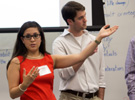Eight-day forum at Bush Presidential Library
teaches at intersection of ideas and disciplines
Students get a crash course in the interplay of technology with political, societal and economic movements.

DALLAS (SMU) – A group of 22 young men and women – students or recent alumni from SMU and five other universities – recently got an eight-day crash course in the interplay of human technological development with major political, societal and economic movements.
The program for the Feld Group Institute’s Junior Fellows was the brainchild of Dallas-based IT leader Charlie Feld, who has been working with SMU’s Lyle School of Engineering since 2007 through its Engineering Management, Information, and Systems Distinguished Advisory Council.
Feld perceives an educational blind spot for many students in technical and business fields – engineering students in particular. Students racing to the finish in those fields may take a smattering of course in the liberal arts, he says, but are unable to “connect the dots” between relevant information gleaned in semester-long survey courses.
What students need, Feld believes, is the ability to recognize economic, cultural, and technological patterns emerging in business and society today, based upon their linkages in the past. The program he put together was anchored from a classroom in the George W. Bush Presidential Library and Museum.
“It’s not any one piece – it’s how the things intersect,” Feld explains. “During the Renaissance the Medici family brought artists, scientists and inventors to Florence – and it was the intersection of all those disciplines that caused people like Da Vinci to break out. They call these intersections the Medici Effect.”
Nineteen-year-old junior fellow Chase Harker is an SMU student pursuing a degree in computer science at the Lyle School. He was struck by how much better he was able to learn from the subjects they discussed once he understood how they were related.
“With the (Feld Group) Institute, it was learning where America has come from by studying its history, and then learning about its political and economic philosophies to understand why our leaders act the way that they do,” Harker said. “It’s like asking not simply, ‘Why do we outsource?’ but, ‘How can we outsource, and why can’t other countries do so?’”
Over the course of the program experts from SMU, the Dallas Federal Reserve Bank, the George W. Bush Institute and Baylor University briefed the students on factors ranging from the philosophy of Plato, to the societal impact of various political movements and competing schools of economic thought. Feld provided the conversational glue to explain how technical innovation has been the result of almost mathematical combinations of history, time and space.
“For example, if you think about the intersection of economics, political or government models, and societal values – and you constrain the time to a period in the United States, roughly the 18th and 19th centuries, you get the first industrial revolution,” Feld said.
Mathew Wilson, SMU associate professor of political science, had a three-hour block of time to deliver his “big picture “message to the fellows. “They seemed intrigued by the idea that different models of government stem from different views of human nature and that those views will determine whether our primary focus is on empowering the state to do good or on limiting the state's capacity to do evil,” Wilson said.
“I think students in all fields of study profit from thinking about problems in interdisciplinary ways,” Wilson said. “A class on the history of science – or even better, one on technology, economics, and society – would be very valuable to students across the humanities, social sciences and technical fields. It would provide really valuable insight into how technology changes the world, but also on how the nature and pace of that change is constrained by political and economic institutions.”
“We talked about how invention changes business models, how it changes cities,” Feld said. “We talked about the social issues those changes caused, such as child labor in factories, which spawned corrections, new regulation and unionization. It was all part of the transformation from an agrarian to an industrial society, powered by people like them – engineers.”
Feld thinks the program was successful because it was fast, though he fully expected some fellows would be confused in the beginning. The fellows started making the connections after a couple of days, he said, and the speedy approach seemed a good fit for people whose learning styles have been shaped by video games and social media.
“This is the sort of transformative experience that everyone should undergo at some point early in their career,” said Marc Christensen, dean of SMU’s Bobby Lyle School of Engineering. “This was an incredibly successful prototype and I look forward to Feld working with the Lyle School to refine and grow this transformational opportunity.”
The Feld Group Institute’s Junior Fellow Program was promoted in concert with the Lyle School, Lyle’s EMIS Department Distinguished Advisory Council, and Lyle’s Hart Center for Engineering Leadership. Participants in the program were nominated through SMU’s Lyle School, Dedman College of Humanities and Sciences, and the Perkins School of Theology. Included in the group were undergraduates, graduate students and young alumni from SMU, UTD, UNT, Texas State University, Brigham Young University and Utah Valley University.
###
10065-web-08/12/13-kc